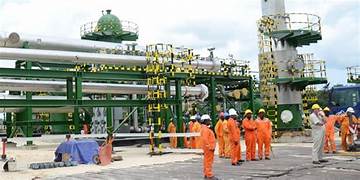By Ediri Ejoh & Chinedu Okafor

The Nigerian Bureau of Statistics, NBS has confirmed that Nigeria’s average oil production dropped by 14.69% year-on-year, to 1.22 million barrels per day in the second quarter of 2023, from 1.43 million recorded in the corresponding period of 2022. The NBS stated this in its 2023 second quarter Gross Domestic Product, GDP report.
The bureau explained that the nation in the second quarter of 2023 recorded an average daily oil production of 1.22 million barrels per day. This was lower than the daily average production of 1.43 recorded in the same quarter of 2022 by 0.22 million barrels per day and lower than the first quarter of 2023 production volume of 1.51 million by 0.29 million barrels per day.
“The real growth of the oil sector was -13.43% year-on-year in the second quarter of 2023, indicating a decrease of 1.66% points relative to the rate recorded in the corresponding quarter of 2022 which was -11.77%. Growth also decreased by 9.22% points when compared with the first quarter of 2023 which was -4.21%.
On a quarter-to-quarter basis, the oil sector recorded a growth rate of -14.12 per cent in the second quarter of 2023. The oil sector contributed 5.34 per cent to the total real GDP in the second quarter of 2023, down from the figure recorded in the corresponding period of 2022 and down from the preceding quarter, where it contributed 6.33 per cent and 6.21 per cent respectively.
On mining, the report stated: “The mining & quarrying sector consists of crude petroleum and natural gas, coal mining, metal ore and quarrying and other mineral sub-activities. This sector grew nominally by -7.11 per cent year-on-year in the second quarter of 2023. Metal ores exhibited the highest growth rate of all the sub-activities at 186.40 per cent, followed by quarrying and other mineral activities at 60.83 per cent. However, crude petroleum and natural gas were the main contributors to the sector with a weight of 85.80 per cent in the second quarter of 2023. Comparing this rate of growth with that of the second quarter of 2022 and the first quarter of 2023 growth rates, there was a decline of 56.86 per cent points and a fall of 3.59 per cent points respectively.
“The mining & quarrying sector contributed 6.58 percent to the overall GDP in the second quarter of 2023, lower than the contributions recorded in 2022 second quarter at 8.20 percent and lower than the previous quarter at 6.73 percent. In real terms, the mining and quarrying sector grew by -12.16 percent year-on-year in the second quarter of 2023. Compared with the same quarter of 2022 and the first quarter of 2023, it was lower by 1.07 percent points and lower by 8.20 percent points respectively. Quarter- on- quarter, the growth rate recorded was -11.11 percent during the quarter. The contribution of mining and quarrying to real GDP in the quarter under review stood at 5.58 percent, lower than the rate of 6.51 percent recorded in the corresponding quarter of 2022 and lower than the 6.26 percent recorded in the first quarter of 2023.”
In a related development, the Nigerian army claimed to have attacked a boat carrying crude oil and heading for open seas. The army launched the attack by air raid. This is coming after Nuhu Ribadu, Nigeria’s national security adviser, said that the nation was losing 400,000 barrels of crude per day to thieves. The Niger Delta region’s illicit oil refineries were bombarded with air raids on Sunday 27 August 2023, according to the Nigerian air force. The Nigerian army claimed to have attacked the boat as well as many illegal locations in the oil-rich state of Rivers. Although aircraft bombardments are rare, Nigeria has been actively combating oil thieves in the Niger Delta by destroying crude-laden ships and tiny illicit refineries.
The majority of illicit oil refineries are often found in streams far from settlements. Authorities have also destroyed illegal oil boats that contained undamaged petroleum after being captured by a private security contractor in the past. The attacks on Sunday happened at the same time Nigeria’s national security adviser, Nuhu Ribadu, said the nation was losing 400,000 barrels of crude per day to thieves, during his visit to defence and oil leaders in Rivers state. But environmentalists have denounced the refineries’ ongoing burning.
On the preceding Saturday, Ribadu had led a presidential team to tour oil and gas installations in Owaza in Abia state and Odogwa in Etche Local Government Area of Rivers state. He said that the acts of oil thieves and pipeline vandals had harmed the nation’s economy and were largely to blame for the country’s growing cost of living. “It’s unfortunate that few individuals would steal our common resources, and in the process cause unbelievable loss to the nation, communities, and the people. Nigeria has the capacity to produce 2 million barrels of crude daily, but we are currently producing less than 1.6 million barrels due to theft and vandalism of pipelines,” he said. “So, we are talking about 400,000 barrels of crude oil going to waste with few criminals and economic saboteurs not even getting much out of it,” he added.
It was reported in July by the Nigerian National Petroleum Company Limited (NNPCL), that between 15 July and 21 July 2023, 40 instances of crude oil theft were reported across the nation. 93 illicit connections were discovered and disconnections and repairs are still being made. The NNPCL added that 69 illicit refineries were found and shut down over the time highlighted.






